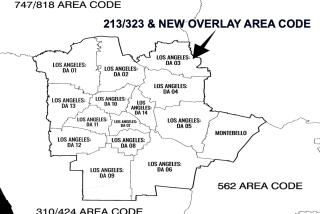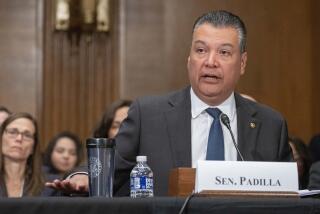Corporate Convenience Is What Underlies the Area Code Overlays
- Share via
Is seven-digit telephone dialing a thing of the past? Must we all learn to memorize 10 digits, and also first dial a 1, even if it’s to make a call to the next-door neighbor or to the new phone installed in your teenager’s bedroom?
That’s the way it will be if SBC Communications Inc., the Texas-based conglomerate that owns Pacific Bell, has its way. And what SBC, with its a huge lobbying operation on the state and federal level, wants, SBC usually gets. The FCC recently approved a $72-billion merger between SBC and Ameritech, making it the nation’s largest phone company providing local service.
In pleadings before the Federal Communications Commission, SBC has demanded that seven-digit dialing be cast into oblivion and that all numbers in the U.S. be overlayed with new “area” codes that bear no obvious connection to an actual geographical area.
“Ultimately, the battle to preserve seven-digit dialing is doomed to failure,” SBC asserted in a filing with the California Public Utilities Commission. Recently, the company appealed to the FCC to block a request by the CPUC and regulatory agencies from five other states to change the way phone numbers are allocated, which would ease the pressure for area code overlay and splits. California argues that of the state’s 180 million numbers in the hands of the phone companies, only 37 million are in use.
“In California,” the PUC warned in its filing, “a significant segment of the public is now aware that . . . the number ‘shortage’ is completely artificial, and the need to create new area codes is thus spurious.”
The old-line phone companies, the so-called “Baby Bells,” as represented by SBC, created the current wasteful system of allocating telephone numbers in blocks of 10,000 to phone service providers, whether they had any customers at all. This system has created a false number shortage leading to this current pressure for area code splits and overlays. Yet SBC insists in its FCC filings that there’s no time to permit the states to explore alternatives because there’s an urgent shortage of new phone numbers.
There isn’t. For example, in the 310 area code, the first slated for overlay in California, SBC concedes that its competitors in the 310 area have more than 1 million unused numbers. Even if SBC itself were to run out of numbers, by its own admission, competitors are poised to step in and provide the needed service.
SBC even admits that its concern is that its competitors will be better positioned to fill new business orders. In short, new local phone service--read that competition--would be provided by newcomers to the field.
Some might have thought that Congress intended just such an outcome when it passed the landmark Telecommunications Act of 1996, which mandated competition in the previously monopolized phone business. But while we have witnessed intense competition among long-distance carriers, there has been precious little for local phone service.
The Telecommunications Act was intended, or so its congressional authors claimed at the time, to put you, the consumer, in control of choosing local as well as long-distance service. Indeed, the principle of “number portability,” meaning that you the customer and not the phone company own your phone number, was enshrined in the law.
You have the legal right to retain your number and switch from one phone company provider to another. But as a matter of practice, that option is rarely offered in the local market or enforced by the FCC. Yet the FCC permits phone companies to charge you as much as 50 cents each month per line for five years, amounting to hundreds of millions of dollars, to recoup the claimed cost of implementing number portability, which is supposed to be in place.
Recognizing the failure of the Telecommunications Act to protect the consumer, legislators have proposed bills in Congress to rectify this very serious omission. Sen. Susan Collins (R-Maine) has introduced S765, with strong bipartisan support that would end the area code mess. A similar bill, HR 2439, was introduced last week by Rep. Dennis Kucinich (D-Ohio) requiring that phone companies stop the current wasteful number allocation system. He cites the FCC’s estimate that at the current rate of misallocation of phone numbers, even with a maximum number of area code splits and overlays, we will run out of numbers in seven years, at which time it could cost as much as $150 billion to fix the problem.
The bills before Congress mandate that number portability be made a reality, and that this technology also be used to allow more efficient distribution of numbers, averting any future shortage. That’s your right, you’re paying for it, and Congress should act to make it a reality.
More to Read
Inside the business of entertainment
The Wide Shot brings you news, analysis and insights on everything from streaming wars to production — and what it all means for the future.
You may occasionally receive promotional content from the Los Angeles Times.










